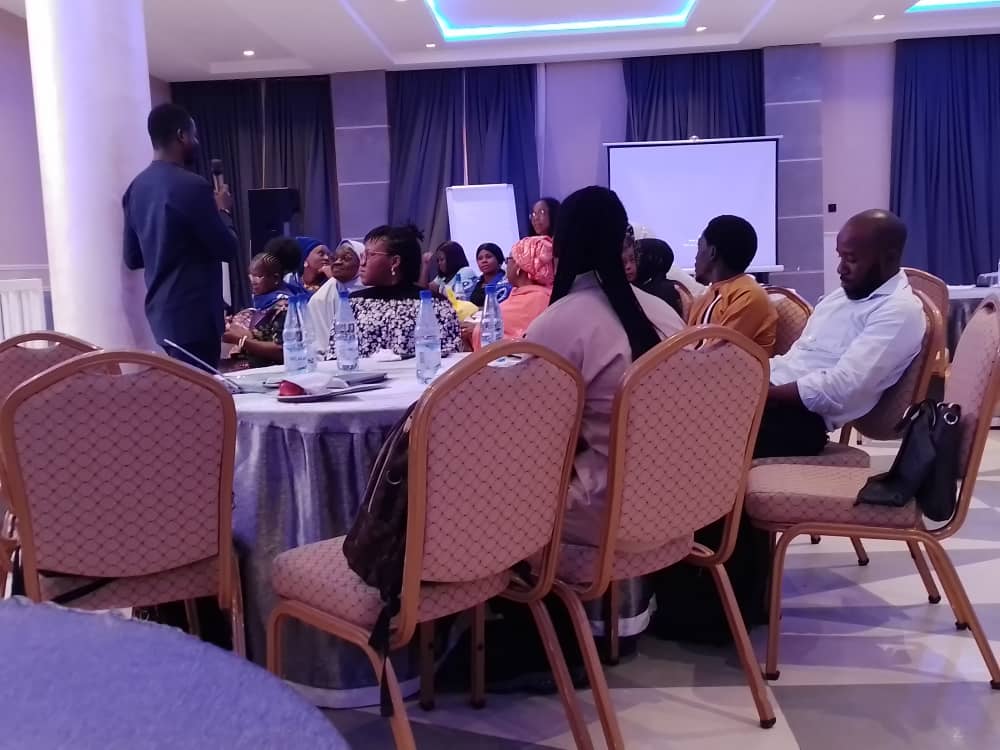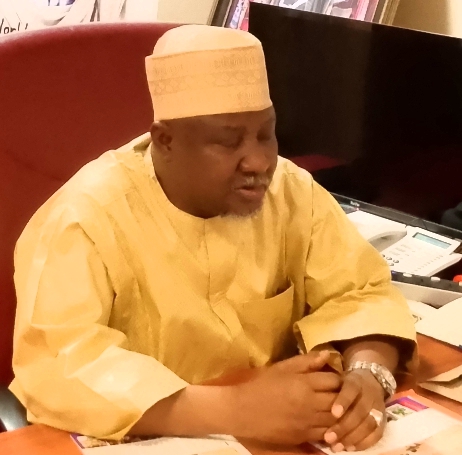Health
2023 World Immunization Week: SCI urges incoming government to prioritise health sector

Child rights organization, Save the Children International (SCI) has called on the incoming government in Nigeria to prioritise the healthcare sector in their administration.

SCI made the call at a dialogue session with immunization stakeholders, to mark the 2023 World Immunization Week.

World Immunization Week, according to World Health Organization (WHO), commemorated in the last week of April, aims to highlight the collective action needed to protect people from vaccine-preventable diseases.
The 2023 celebration with the theme “The big catch-up” kicked off on April 24 and will run through April 30.
Speaking, the Advocacy Campaign and Policy Manager for Save the Children International, Ifedilichukwu Ekene Innocent stressed the need for an improved budget for the health sector at all level of governance in the country.
According to him, vaccination must be at the front burner of every government passionate about the health of its citizens.
He said “The new government as they come in at federal, state and local government, should realise that health is wealth. They should ensure that they budget properly. And what we mean by budgeting properly is using evidence to budget. You know, when you don’t budget with evidence, there will be a lot of mistakes.
For instance, we need to use data to be able to procure the vaccines. Until we do that, it will be difficult for us to say that we are making progress as a country.
“We want the incoming government at various levels to commit to this, resolve logistic challenges and reduce the number of zero dose children that are spread all over the country”.
Ifedilichukwu also called for necessary funding that will address logistics and cold chain issues. He further stressed the need for training of healthcare personnel for effective service delivery.
“Government should be able to ensure that funding is available, logistics and challenges are sorted out, cold chain challenges are sorted out and health workers are properly trained to administer these vaccines.
“When these vaccines come in, they need to be kept in a proper and conducive environment so that they maintain the quality of the vaccine. We are using this opportunity as an organisation to plead with the federal government to ensure that the cold chain equipments all over the country are properly maintained.
“let’s begin to talk about solar power and facilities so that fridges and all these cold chains that are used for storing these vaccines are constantly on normal temperature as prescribed by relevant agencies”, he added.
Director General of West African Institute of Public Health, Dr Francis Ohanyido said, it is very important for Nigeria as a country to fund vaccination.
He stressed the need for accountability and transparency in the utilization of these funds and advised stakeholders and Non Governmental Organisations to track health budget and ensure that funds are used for the exact purpose designated.
On his part, Chief Executive Officer, Talkhealthnja, Dr Laz Eze called for the production of local vaccines, stating that this will improve vaccines coverage in the country.
“It is long overdue for Nigeria to revive local vaccines production. Over thirty years ago we were producing yellow fever vaccines and we have a facility in Lagos, Yaba specifically.
“We need much more research, create an enabling environment for the pharmaceutical companies to begin to do this. We have more than 100 pharmaceutical companies in Nigeria.
“Vaccine production in Nigeria is not just a health issue, it is an economy issue.
“It is extremely important that the new government prioritises local vaccines production, do whatever is necessary to make sure this happens.
“The WHO has already designated Nigeria as a hub within the West Africa sub-region with four other countries on local vaccine production”, he added.
Representative from the Federal Ministry of Health, Dr Omokore Oluseyi noted that the low percentage of vaccination coverage is due to inadequate sensitisation and enlightenment. He said education of parents and care givers will offer better results.

Health
National hospital, private institutions sign MoU to strengthen healthcare workforce

The Federal Government has facilitated the signing of a Memorandum of Understanding (MoU) between the National Hospital and four private institutions to enhance the capacity of the healthcare workforce.

The participating institutions include Nile University, Cosmopolitan University, Yangongwo College of Nursing Sciences, and Concerned Medix Foundation.

This was disclosed in a statement signed by the Ministry’s Deputy Director of Information and Public Relations, Mr. Alaba Balogun on Friday.
Alaba revealed that during the signing ceremony, the Coordinating Minister of Health & Social Welfare, Prof. Muhammad Ali Pate, emphasized that the MoU aligns with the administration’s policy to expand training capacities.
Prof. Pate further highlighted that this initiative reflects President Bola Ahmed Tinubu’s commitment to increasing the training of health workers, addressing workforce gaps, and maintaining professional standards through the Regulatory and Professional Schools Division of the Hospital Services Department of the Ministry.
He stressed the government’s responsibility to tackle multiple challenges, including infrastructure, equipment, and human capital development, noting that Nigerian health workers are highly sought after due to their excellent training.
“Thankfully, because they are well-trained, we are very proud of them. If we weren’t training them, they wouldn’t have been attractive to other countries.
“Unfortunately, that has implications on the service delivery at home. So as a government, we took a progressive stance to say, look, let’s train more.
“So that even if those who are trained leave, some will stay. And even those who have gone away might come back to serve. And, that is the driving force behind this policy approval by President Bola Ahmed Tinubu,” the Coordinating Minister pointed out.
Prof. Pate also underscored the crucial role of the private sector in achieving the government’s objectives, noting that Nigeria’s healthcare system operates as a mix of public and private institutions.
“So, the private sector has a space, and I am very pleased that you have joined hands with the National Hospital to be able to really see how the capabilities of the hospital can help you train more clinicians”, he said.
Speaking at the event, the Chief Medical Director of the National Hospital, Prof. Raji Mahmud, commended President Bola Ahmed Tinubu for prioritizing improvements in the healthcare system.
He affirmed that the collaboration and signing of the MoU between the National Hospital and private institutions would significantly expand healthcare workforce training.
Prof. Mahmud further noted that three out of the four institutions are primarily training centers focused on medical and nursing education in partnership with the National Hospital, Abuja.

Health
President Tinubu appoints Chief Medical Directors for medical centres across the country

In a bid to enhance medical care for Nigerians, President Bola Ahmed Tinubu has appointed six new Chief Medical Directors (CMDs) for Federal Hospitals across the country.

Among those appointed is Dr. Ikrama Hassan, who will now serve as the Chief Medical Director of the Federal Teaching Hospital, Lafia, Nasarawa State. Dr. Hassan, a seasoned consultant physician, previously served as the Medical Director of Dalhatu Araf Specialist Hospital before its elevation to a teaching hospital.

The full list of newly appointed CMDs includes:
Prof. Olusegun Sylvester Ojo – Federal Teaching Hospital, Akure, Ondo State.
Prof. Yusuf Mohammed Abdullahi (Reappointed) – Federal Teaching Hospital, Gombe.
Dr. Dauda Abubakar Katagum – Federal Teaching Hospital, Azare, Bauchi State.
Dr. Ikrama Hassan – Federal Teaching Hospital, Lafia, Nasarawa State.
Dr. Ali Mohammed Ramat – National Orthopedic Hospital, Maiduguri, Borno State.
Dr. Haruna Abubakar Shehu – Federal Medical Centre, Kafanchan, Kaduna State.
Each appointment is for a four-year term, effective from the date of assumption of duty.
President Tinubu congratulated the appointees, urging them to uphold the highest standards of professionalism and service delivery. He reaffirmed his administration’s commitment to improving medical infrastructure and ensuring quality healthcare access for all Nigerians.

Health
Kebbi Senator calls for establishment of Federal Medical Centre in Zuru, Kebbi State

Senator representing Kebbi South Senatorial District, Garba Maidoki has called for the establishment of a Federal Medical Centre to be situated in Zuru to cater for the health needs of the District and its environs.

The lawmaker in the 10th National Assembly made the call during a public hearing on the Bill to establish Federal Medical Centre in Zuru organized by the Senate Committee on Health.

In a memorandum presented at the hearing by the lawmaker, he explained that the aim is to provide tertiary healthcare facilities to the people of Zuru in Kebbi State in the North West Nigeria.
He further noted that the establishment of FMCs across the country was initiated by Decree No. 10 of 1985, with the aim of providing tertiary healthcare services.
According to him, the FMC Birnin Kebbi was established on June 6, 2000, and has since been upgraded to a University Teaching Hospital.
The lawmaker stated that the large population and the challenges faced in accessing healthcare services, necessitates the establishment of FMC in the state.
“In Birnin Kebbi, the state capital, the distance between Zuru Emirate and Birnin Kebbi is approximately 240 km, making it difficult for patients, especially children and pregnant women, to access secondary and tertiary healthcare facilities”, he lamented.
Senator Maidoki charged his colleagues and the Federal Ministry of Health and Social Welfare to support the bill, saying healthcare is a fundamental privilege expected from any government.
The lawmaker who is the sponsor of the bill told journalists during a chat that the Federal Medical Center, when established will not only cater for the tertiary healthcare needs of Kebbi State, but will also serve the adjoining states like Niger and Zamfara.

-

 Politics1 week ago
Politics1 week agoOpposition leaders announce coalition to challenge Tinubu in 2027
-

 Foreign6 days ago
Foreign6 days agoHouthis declare Ben-Gurion Airport ‘no longer safe’ after renewed Gaza fighting
-

 Politics1 week ago
Politics1 week agoYahaya Bello deceptively arranging recall of Senator Natasha, desperate to replace her – Constituents
-

 Politics1 week ago
Politics1 week agoAtiku, El-rufai, Obi condemn Tinubu’s suspension of Rivers Governor, demand reversal
-

 News1 week ago
News1 week agoWhy Christ Embassy’s Pastor Chris holds Abuja mega crusade – Fisho
-

 News7 days ago
News7 days agoUmeh denies receiving $10,000 with other 42 Senators to support state of emergency in Rivers
-

 Crime1 week ago
Crime1 week agoGhana’s anti-drug agency nabs Nigerian drug kingpin, Uchechukwu Chima, seizes $2.1m worth of cocaine, heroin
-

 Business1 week ago
Business1 week ago20 new millionaires emerge from Fidelity Bank GAIM 6 promo





















